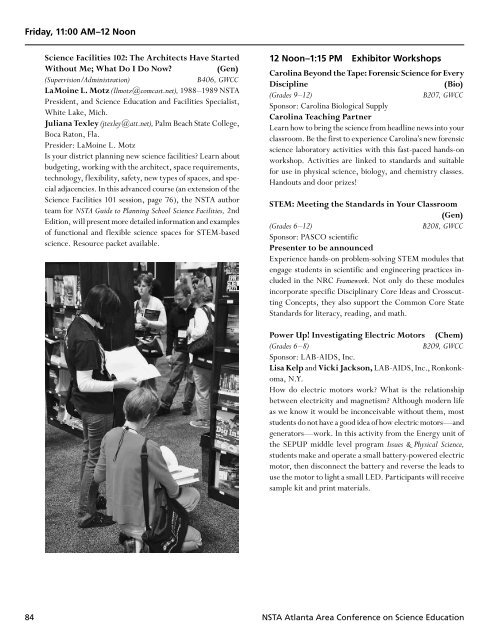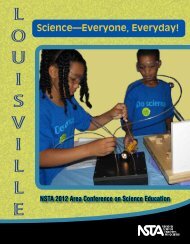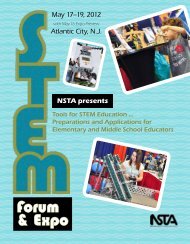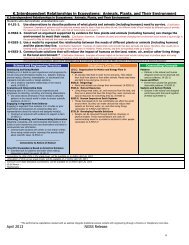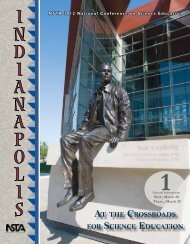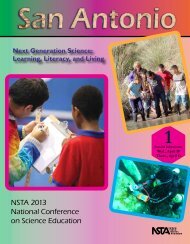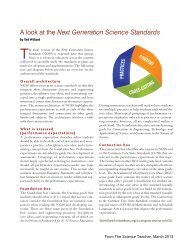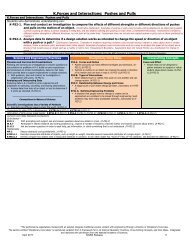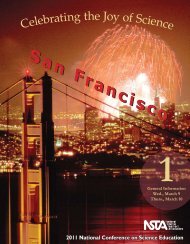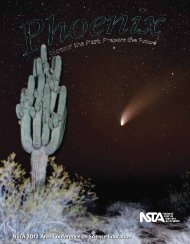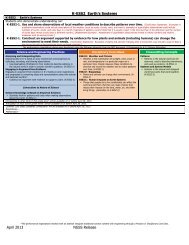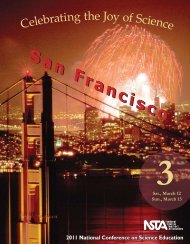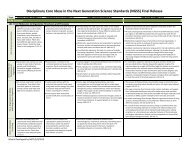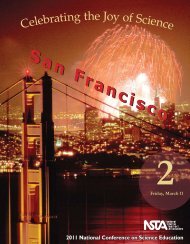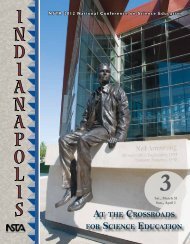Atlanta Conference Program
Atlanta Conference Program
Atlanta Conference Program
You also want an ePaper? Increase the reach of your titles
YUMPU automatically turns print PDFs into web optimized ePapers that Google loves.
Friday, 11:00 AM–12 Noon<br />
Science Facilities 102: The Architects Have Started<br />
Without Me; What Do I Do Now<br />
(Gen)<br />
(Supervision/Administration)<br />
B406, GWCC<br />
LaMoine L. Motz (llmotz@comcast.net), 1988–1989 NSTA<br />
President, and Science Education and Facilities Specialist,<br />
White Lake, Mich.<br />
Juliana Texley (jtexley@att.net), Palm Beach State College,<br />
Boca Raton, Fla.<br />
Presider: LaMoine L. Motz<br />
Is your district planning new science facilities Learn about<br />
budgeting, working with the architect, space requirements,<br />
technology, flexibility, safety, new types of spaces, and special<br />
adjacencies. In this advanced course (an extension of the<br />
Science Facilities 101 session, page 76), the NSTA author<br />
team for NSTA Guide to Planning School Science Facilities, 2nd<br />
Edition, will present more detailed information and examples<br />
of functional and flexible science spaces for STEM-based<br />
science. Resource packet available.<br />
12 Noon–1:15 PM Exhibitor Workshops<br />
Carolina Beyond the Tape: Forensic Science for Every<br />
Discipline<br />
(Bio)<br />
(Grades 9–12)<br />
B207, GWCC<br />
Sponsor: Carolina Biological Supply<br />
Carolina Teaching Partner<br />
Learn how to bring the science from headline news into your<br />
classroom. Be the first to experience Carolina’s new forensic<br />
science laboratory activities with this fast-paced hands-on<br />
workshop. Activities are linked to standards and suitable<br />
for use in physical science, biology, and chemistry classes.<br />
Handouts and door prizes!<br />
STEM: Meeting the Standards in Your Classroom<br />
(Gen)<br />
(Grades 6–12)<br />
B208, GWCC<br />
Sponsor: PASCO scientific<br />
Presenter to be announced<br />
Experience hands-on problem-solving STEM modules that<br />
engage students in scientific and engineering practices included<br />
in the NRC Framework. Not only do these modules<br />
incorporate specific Disciplinary Core Ideas and Crosscutting<br />
Concepts, they also support the Common Core State<br />
Standards for literacy, reading, and math.<br />
Power Up! Investigating Electric Motors (Chem)<br />
(Grades 6–8)<br />
B209, GWCC<br />
Sponsor: LAB-AIDS, Inc.<br />
Lisa Kelp and Vicki Jackson, LAB-AIDS, Inc., Ronkonkoma,<br />
N.Y.<br />
How do electric motors work What is the relationship<br />
between electricity and magnetism Although modern life<br />
as we know it would be inconceivable without them, most<br />
students do not have a good idea of how electric motors—and<br />
generators—work. In this activity from the Energy unit of<br />
the SEPUP middle level program Issues & Physical Science,<br />
students make and operate a small battery-powered electric<br />
motor, then disconnect the battery and reverse the leads to<br />
use the motor to light a small LED. Participants will receive<br />
sample kit and print materials.<br />
84 NSTA <strong>Atlanta</strong> Area <strong>Conference</strong> on Science Education


